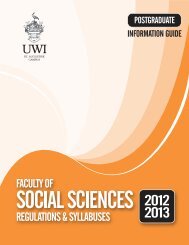Faculty of Humanities and Education (Postgraduate) - The University ...
Faculty of Humanities and Education (Postgraduate) - The University ...
Faculty of Humanities and Education (Postgraduate) - The University ...
Create successful ePaper yourself
Turn your PDF publications into a flip-book with our unique Google optimized e-Paper software.
132<br />
POSTGRADUATE REGULATIONS & SYLLABUSES 2012 - 2013<br />
THE FACULTY OF HUMANITIES & EDUCATION<br />
ASSESSMENT<br />
Coursework Assignments -100%<br />
<strong>The</strong> nature <strong>of</strong> the course dem<strong>and</strong>s that participants actively<br />
engage in the various assessment practices/procedures over the<br />
entire period <strong>of</strong> the course <strong>and</strong>, thus, assessment by coursework<br />
only would be most appropriate.<br />
Participants will complete the following pieces <strong>of</strong> coursework:<br />
• A number <strong>of</strong> small assignments (6-8) to develop<br />
competencies related to purposes <strong>and</strong> formats <strong>of</strong><br />
assessment in science, that draw on theoretical<br />
underpinnings, as well as cultural <strong>and</strong> contextual issues.<br />
• A major assignment to plan, design, <strong>and</strong> implement an<br />
assessment strategy for a specified science instruction<br />
endeavour. This is intended to be developmental, so<br />
feedback is required at each stage to ensure that all criteria<br />
are met.<br />
• An assignment to demonstrate developing competence<br />
in the collection, analysis <strong>and</strong> use <strong>of</strong> assessment data in<br />
science with the aid <strong>of</strong> computer programs<br />
• A reflective journal in which participants will critique their<br />
learning experiences <strong>and</strong> document significant growth<br />
points.<br />
Participants will submit a portfolio at the end <strong>of</strong> the course. <strong>The</strong><br />
portfolio will contribute 100% <strong>of</strong> the course marks. It will include<br />
the following compulsory components:<br />
• <strong>The</strong>completedcourseworkassignments(asdetailedabove),<br />
properly captioned to indicate growth <strong>and</strong> development as<br />
practitioners in the relevant skills/competencies, including<br />
drafts, written feedback, action taken, <strong>and</strong> supporting<br />
materials (70%)<br />
• <strong>The</strong> reflective journal (15%)<br />
• A scholarly reflective analysis <strong>of</strong> growth <strong>and</strong> development<br />
in the area <strong>of</strong> assessment in science over the period <strong>of</strong><br />
the course (with reference to the portfolio components),<br />
including plans for continued improvement in assessment<br />
practices, as well as for further pr<strong>of</strong>essional growth (15%).<br />
REQUIRED READING<br />
Atkin, J. M., & C<strong>of</strong>fey, J. E. (Eds.). (2003). Everyday Assessment in the<br />
science classroom. Arlington, VA: National Science Teacher<br />
Association Press.<br />
Doran, R., Chan, F., Tamir, P., & Lenhardt, C. (2002). Science<br />
educator’s guide to laboratory Assessment. Arlington, VA:<br />
National Science Teacher Association Press.<br />
Shepardson, D. P. (Ed.). (2001). Assessment in science: A guide to<br />
pr<strong>of</strong>essional development <strong>and</strong> classroom practice. New York:<br />
Kluwer Academic.<br />
RECOMMENDED READING<br />
Berenson, S. B., & Carter, G. S. (1995). Changing Assessment practices<br />
in science <strong>and</strong> mathematics. School Science <strong>and</strong> Mathematics,<br />
95, 182-186.<br />
Blosser, P.E. (1990). Using questions in science classrooms Research<br />
matters – to the Science Teacher [On-line], No. 9001. Available:<br />
http://www.educ.sfu.ca/narstsite/publications/research/<br />
question.htm<br />
Cain, M., Edwards-Henry, A. M., & Rampersad, J. (2005). Developing<br />
portfolios for integrating teaching, learning <strong>and</strong> assessment.<br />
St. Augustine, Trinidad: School <strong>of</strong> <strong>Education</strong>, UWI.<br />
Chin, C., Brown, D. E., & Bruce, B. C. (2002). Student-generated<br />
questions: A meaningful aspect <strong>of</strong> learning in science.<br />
International Journal <strong>of</strong> Science <strong>Education</strong>, 24 (5), 521-549.<br />
Costa, A. L. (Ed.). (2001). Developing minds: A resource book for<br />
teaching thinking (3rd edition). Alex<strong>and</strong>ria, VA: Association<br />
for Supervision <strong>and</strong> Curriculum Development. (Specific<br />
Chapters).<br />
Doran, R., Chan, F., & Tamir, P. (1998). Science educator’s guide<br />
to assessment. Arlington, VA: National Science Teachers<br />
Association Press.<br />
Fellows, N. (1994). A window into thinking: Using student writing to<br />
underst<strong>and</strong> conceptual change in science learning. Journal <strong>of</strong><br />
Research in Science Teaching, 31(9), 985-1001.<br />
Shakespeare, D. (2003). Starting an argument in science lessons.<br />
School Science Review, 85(311), 103-108.<br />
Stein, M. (2001). Assessment models that integrate theory <strong>and</strong> best<br />
practice. In D. R.<br />
Lavoie & W-M. Roth (Eds.), Models <strong>of</strong> science teacher preparation:<br />
<strong>The</strong>ory into practice, (pp. 149-162). Norwell, MA: Kluwer<br />
Academic.<br />
YEAR:<br />
SEMESTER:<br />
COURSE CODE: EDSC 6004<br />
COURSE TITLE: INFORMATION AND COMMUNICATION<br />
TECHNOLOGIES IN THE SCIENCE CLASSROOM<br />
NUMBER OF CREDITS: 4<br />
COURSE DESCRIPTION:<br />
Rationale<br />
Today, teaching <strong>and</strong> learning are heavily influenced by the<br />
technological world in which we live. <strong>The</strong> industrial age has<br />
evolved into the information age, <strong>and</strong> thus there is the need to use<br />
information <strong>and</strong> communication technologies (ICT) effectively,<br />
<strong>and</strong> to underst<strong>and</strong> the implications <strong>of</strong> their use. This course<br />
provides students with current theory <strong>and</strong> technological skills<br />
needed to integrate ICT effectively into the science curriculum.<br />
Students will be introduced to the use <strong>of</strong> both hardware (such<br />
as the computer, multi-media devices, computer interface<br />
devices, etc.) <strong>and</strong> s<strong>of</strong>tware applications. <strong>The</strong>y will examine the<br />
many issues surrounding the integration <strong>of</strong> ICT into the science<br />
curriculum, <strong>and</strong> will engage in the development <strong>of</strong> curriculum<br />
material that incorporates ICT in meaningful ways.

















